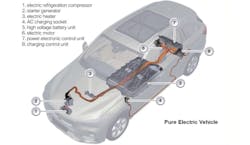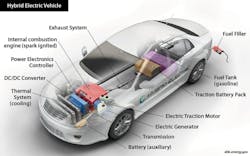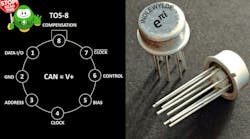Leading EV Maker to Introduce First-Ever Hybrid Electric Vehicle
This article is part of the April 1st series in the Humor section of our Series Library.
A market-leading electric-vehicle (EV) vendor (who cannot be named for legal reasons) is planning to make a “shocking” announcement that will undoubtedly stun shareholders, stock analysts, potential customers, and the media. The battery-only EV pioneer will be adding hybrid EVs (HEVs) to its vehicle lineup, beginning in the 2026 model year.
According to an unnamed PR spokesperson, the reason is that industry-wide sales of the pure EVs (see figure) have plateaued at about 10% of the American market and further growth seems stalled, with unsold cars piling up in storage lots. In contrast, Toyota offers a full line of hybrid vehicles that are back-ordered for many months due to high demand (see the Wall Street Journal, Feb. 16, 2024, “Toyota Cashes In on Booming Hybrid Sales”).
The spokesperson acknowledged that consumer concerns continue about EVs with respect to upfront cost, range, availability of working charging stations, time spent while recharging or waiting for a vacant charger slot, battery wear-out, resale value, and repair costs. These and other factors are discouraging the remaining 90% of non-adopters from seriously considering or committing to an EV—and those factors won’t change in the next few years.
The new vehicle lineup will include both pure HEVs as well as plug-in HEVs, but the relative proportion will depend on consumer preferences. “We have to face reality and respond to legitimate and on-going consumer concerns and issues,” noted the spokesperson. “Hybrids have a much smaller total lifecycle impact from mining and refining of basic minerals to end-of-life recycling than pure EVs, so the presumed environmental benefits of EVs just aren’t there when you consider the total picture.”
Also of interest, the spokesperson challenged the widespread use of the term “fossil fuels” for gasoline and other petroleum-based hydrocarbons. “A better term would be ‘naturally derived biofuels’ as they are similar in many ways to presumably environmentally friendly ethanol which is derived from corn.
“That ethanol is created by using an accelerated fermentation process while so-called fossil fuels are the result of a natural aging process over millions of years. In many ways, these so-called ‘fossil fuels’ are less environmentally burdened than biofuels, if you look at the underlying science.”
The company faces another challenge in offering hybrids beyond the serious issue of diluting their brand image, namely the increase in hybrid-vehicle competition. In addition to hybrid-vehicle leader Toyota with its Prius (which has almost become a generic term for HEVs, similar to Band-Aids or Kleenex), automotive companies, including General Motors and Ford, are facing pressure from their dealers to expand and promote their own hybrid lines, again in response to consumer preferences and demand (Wall Street Journal, Jan 29, 2024, “GM Went All In on EVs. Dealers Say Buyers Want Hybrids.”)
Read more articles in the April 1st series in the Humor section of our Series Library.






